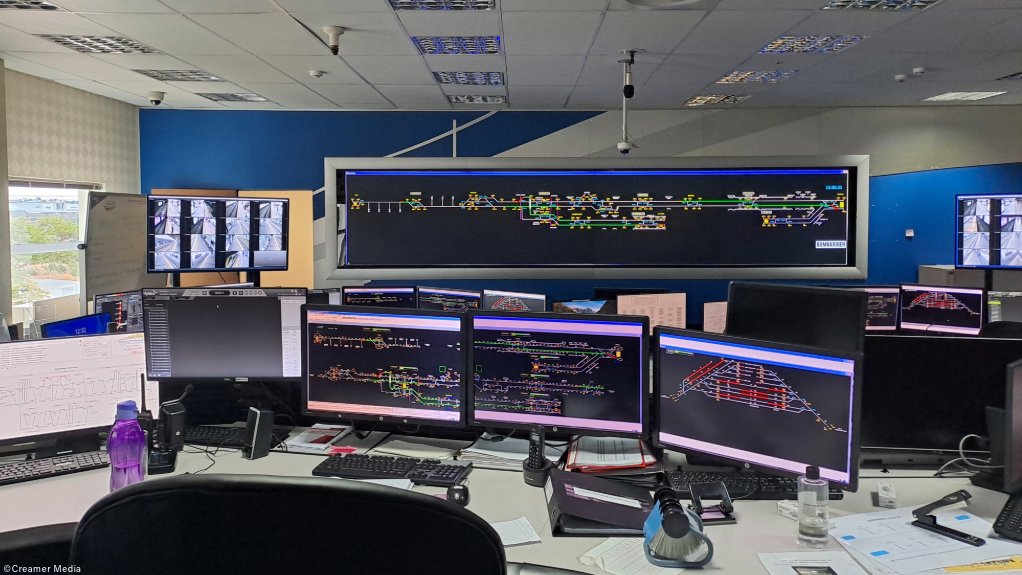The Bombela Operating Company (BOC) has highlighted its work in ensuring an effective, efficient and safe Gautrain operation, while also pursuing sustainability at a broader level, as it aims to contribute toward creating an improved, integrated public transport industry in South Africa.
BOC, which operates and maintains the Gautrain rapid rail system, is a joint venture company between local black-owned company SPG (with a 36.6% interest) and French urban transport operator RATP Dev (with a 63.4% shareholding).
The Gautrain Management Agency, which manages and oversees the Gautrain, signed a concession agreement with the current concessionaire, the Bombela Concession Company, in 2006. Bombela Concession Company, which designed, part-financed and built the final design of the Gautrain system, contracted BOC, to maintain and operate the service.
The Gautrain’s assets are owned by the Gauteng government and the current concession agreement ends in March 2026, following a 19.5-year term.
Speaking to Engineering News in an exclusive interview in November, BOC CEO Nthabiseng Kubheka explained that BOC is responsible for ensuring that the Gautrain runs efficiently.
This entails core duties of operations and maintenance of the entire Gautrain infrastructure and assets; as well as non-core duties for all the support or contracted services, including security, cleaning and maintenance of buildings and equipment at stations. Most of the latter work is subcontracted and overseen from BOC’s headquarters based at the Gautrain Depot in Midrand.
The Operational Control Room at the depot is where the Gautrain line is monitored, ensuring that it runs smoothly and efficiently and that any technical issues are rectified as quickly as possible.
The Midrand premises also has a maintenance workshop, where trains are maintained daily during ‘engineering hours’, from 22:00 to 04:00, for next-day service, Kubheka explained. A sweeper train is also run daily on the lines prior to any services starting for the day to confirm readiness for service from a safe operations point.
BOC also oversees the feeder buses and midibuses, which are used to transport commuters to and from the Gautrain stations and various communities closer to their destinations.
It also manages and maintains parking lots at the Gautrain stations for those customers that use their cars and bikes to get to the station.
“The Gautrain is a multi-modal, integrated system that allows for ordinary South Africans to get to their destinations,” Kubheka averred.
She highlighted that the system is “working very well’, with the majority of users being professionals, businesspeople, students and tourists.
“These are important people in the economy, and it is necessary to ensure that they get to their destinations safely and efficiently,” Kubheka emphasised.
In this vein, she highlighted that the Gautrain boasts an average availability rate of over 95%, currently at 99%, while punctuality is also above 95%.
Kubheka pointed out that these are part of several key performance indicators that BOC must meet in terms of its contract to prevent it from being penalised.
In terms of safety, closed-circuit television cameras along the Gautrain route are monitored in the Security Control Centre at the Depot. A team here alerts the requisite people on the service if an issue arises and security companies BOC works with can also be alerted if necessary.
There are also guards on the trains, as well as guards at the station who are trained to ensure passenger safety and advise them on how to properly navigate the Gautrain service safely, Kubheka noted.
There is also a lost and found service for property, if commuters should leave theirs behind, Kubheka said. This is managed by the customer service team, who are also responsible for serving the customers at the stations.
She pointed out that, while BOC is contractually obliged to ensure safety only within the stations and rail alignment, it has also formed working groups with other stakeholders to find solutions to issues facing commuters outside stations, including crime and challenges with e-hailing services. She said progress has been made at some stations, while others are more challenging.
As reported by Engineering News, BOC was recently awarded the Train Operator of the Year award at the inaugural Rail Industry Awards, hosted by the Railway Safety Regulator, which recognised the quality of operations and maintenance of the Gautrain.
Kubheka said this underscores BOC’s efforts, especially as it was competing against over 200 operators from across the Southern African Development Community region.
SUSTAINABILITY
In a rail industry that is typically male-dominated, BOC is differentiated by being women-led. In her tenure at the organisation since 2021, Kubheka, who is also RATP Dev Country Director, has also striven to bolster gender parity and representation of other groups
BOC currently has between 2 100 and 2 200 employees, with over 500 of these being direct employees, Kubheka informed.
Aligned to RAPT Dev’s way of doing business, BOC started with a majority of French employees who brought in their expertise, and gradually, this number was reduced to make the company a largely local workforce, Kubheka said.
She noted that about 53% of the company’s workforce is female. About 70% of its executive-level employees are female and female bus drivers are also being given the opportunity for upskilling.
Kubheka also mentioned that BOC provides development and leadership programmes for its staff, as well as financial support for some who opt to further their studies.
It also offers certain funding support at tertiary levels, with no obligation for these students to work for BOC after completing their studies. “It’s about us making sure that we create South Africans that can be responsible corporate citizens and add value to this country,” she emphasised.
She also referenced BOC’s community development, which is keenly focused on areas surrounding its stations, some of which are in close proximity to disadvantaged areas.
This includes, for example, supporting non-profit organisations in Alexandria, close to the Sandton and Marlboro stations.
Moreover, BOC and RAPT Group’s global foundation provides funding to Sizanani Mentorship Programme, which supports 380 students from Alexandra township. This is where BOC employees also volunteer as mentors to the pupils and students who are beneficiaries of the programme.
“There is a clear consciousness about needing to give back to South Africa, to its youth, and contribute to the overall improvement of the public transport in the country,” Kubheka emphasised.
BEYOND RAIL
Kubheka also highlighted the Gautrain’s role in “nation building and social cohesion”.
This includes the Gautrain being successfully used for events, for example, providing discounted or free rides for passengers attending certain sporting events.
Kubheka said this was an area where the company sees considerable potential, with the Gautrain perceived as the ideal platform for transporting large amounts of people for events, in a safe and efficient manner, and boasting the capacity to undertake this for sports, cultural events and conferences.
BOC would leverage the RAPT Dev’s expertise in executing events management globally, including the recent Olympics and the Rugby World Cup, for future events it would pursue with the Gautrain, including, for example, adding activities at stations that complement these.
Kubheka said BOC wants the Gautrain to be part of the positive narrative of the country, with it playing a role in how visitors perceive the country, and ideally positioning it as open for business.
Edited by: Chanel de Bruyn
Creamer Media Senior Deputy Editor Online
EMAIL THIS ARTICLE SAVE THIS ARTICLE
ARTICLE ENQUIRY
To subscribe email subscriptions@creamermedia.co.za or click here
To advertise email advertising@creamermedia.co.za or click here















